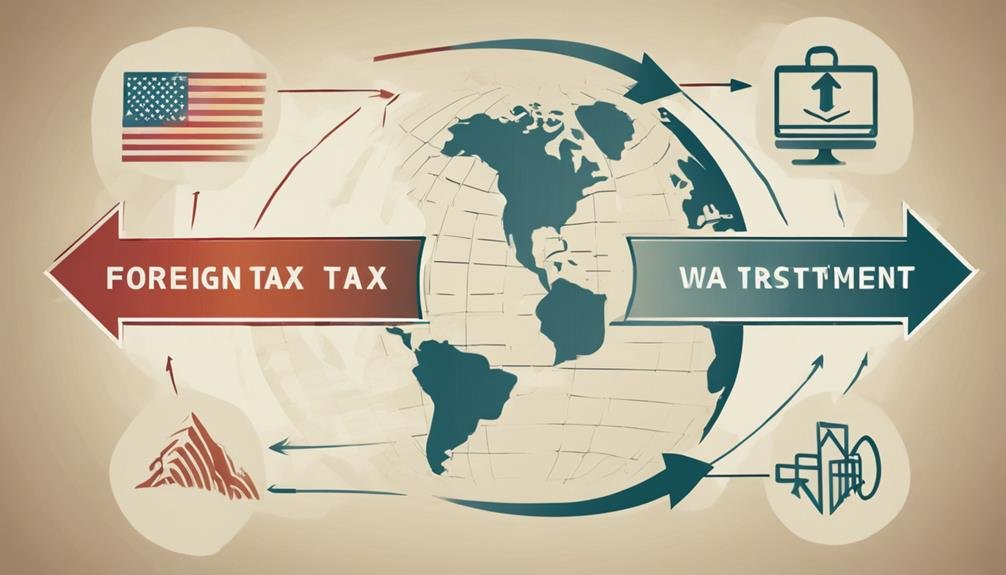Strategic tax planning is key to optimizing your investment returns as an expat. By implementing tailored tax strategies and leveraging international regulations, you can minimize tax burdens while maximizing your financial gains. However, an essential aspect often overlooked can greatly impact your returns. Understanding how tax compliance intertwines with your investments allows you to access opportunities beyond mere financial gains. Explore Maximizing Expat Investment Returns Through Tax Compliance.
Key Takeaways
- Utilize Foreign Tax Credits to offset taxes paid abroad.
- Leverage tax treaties to avoid double taxation.
- Optimize investments with tax-efficient asset location.
- Consider Roth IRA conversions for tax advantages.
- Seek professional advice for tailored tax strategies.
Expat Tax Planning Strategies
When planning your expat taxes, you must employ strategic measures to minimize your tax liabilities and uphold compliance with international tax regulations. One important aspect of Maximizing Expat Investment Returns Through Tax Compliance planning is leveraging tax treaties and utilizing the Foreign Tax Credit to optimize your tax situation and mitigate the risk of double taxation. By effectively understanding and using these tools, expatriates can ensure they aren’t paying more tax than necessary on their worldwide income.
Proactive tax planning strategies play a significant role in helping expats maximize their investment returns while staying compliant with tax laws. By structuring your investments tax-efficiently and staying informed about the latest developments in international tax regulations, you can enhance your returns and avoid potential penalties for non-compliance. Proper management of tax documents and timely filing are also key components of effective expat tax planning to ensure that you meet your tax obligations accurately and on time.
Benefits of Foreign Earned Income Exclusion
Understanding the benefits of the Foreign Earned Income Exclusion (FEIE) is essential for optimizing tax planning as an expat and maximizing investment returns. The FEIE enables expats to exclude up to $108,700 (2021) foreign-earned income from U.S. taxes, offering a significant advantage in reducing liabilities.
Qualifying for FEIE involves meeting the Physical Presence Test or the Bona Fide Residence Test. This exclusion can apply to various forms of income, including wages, salaries, bonuses, self-employment earnings, and housing allowances.
By leveraging FEIE effectively, expats can minimize their tax burdens and retain more of their income for investment purposes. Successfully handling the criteria and constraints associated with FEIE is pivotal for expats seeking to optimize their tax compliance and enhance their financial planning strategies.
Understanding how to maximize the benefits of FEIE is key to ensuring that expats make the most of their overseas earnings while staying compliant with tax regulations.
Utilizing Foreign Tax Credit

By leveraging the Foreign Tax Credit, expats can strategically offset taxes paid to foreign countries on their dual-taxed income, optimizing their overall tax efficiency and minimizing their foreign income tax burden.
Form 1116 plays a pivotal role in accurately calculating the Foreign Tax Credit. The U.S. tax liability on the same income limits the credit amount, guaranteeing that the U.S. can assist with domestic tax obligations.
Any excess foreign tax paid can be carried over to future years or utilized in amended returns, providing flexibility in managing tax liabilities. Using the Foreign Tax Credit effectively helps expats reduce their tax burden on foreign income. It maximizes the benefits of tax treaties and agreements between the U.S. and other countries.
Importance of Tax EqualizatiU.S.policy
Tax equalization benefits expatriates by ensuring they pay taxes consistently as if they were in their home country, preventing financial discrepancies.
Compliance with tax equalization policies simplifies reporting processes for employees and employers, maintaining transparency and accuracy.
Tax Equalization Benefits
Implementing tax equalization policies guarantees expats aren’t subjected to additional tax burdens resulting from international assignments. These policies provide financial stability and predictability for expats by ensuring their tax position remains consistent with their home country.
Employers leverage tax equalization to navigate the complexities of varying tax rates in different countries, ultimately attracting and retaining top talent for international assignments. By maintaining a level playing field in tax obligations, expats can focus on their roles without the stress of managing potential tax discrepancies.
Tax equalization benefits expats and employers, creating a conducive environment for successful international assignments and fostering a sense of fairness in the taxation process.
Compliance Simplifies Reporting
A robust understanding and adherence to tax equalization policies is paramount to guarantee smooth and accurate financial reporting for expatriates. Compliance with these policies simplifies reporting processes by:
- I am calculating hypothetical tax liabilities to offset differences between home and host country tax systems.
- I am minimizing financial risks and uncertainties for expatriates.
- Helping employers attract and retain top talent in international assignments.
Avoiding Double Taxation
A strong understanding of avoiding double taxation through tax equalization policies is essential to ensure expatriates’ financial stability and compliance with tax regulations. Tax equalization policies play a significant role in balancing tax liabilities between the host country and the expat’s home country, ensuring they don’t end up paying more or less tax than they’d in their home country.
Leveraging Tax Treaties for Expat Investments
Understanding that tax treaties are vital in avoiding double taxation for expat investments would be best. You can benefit from lower withholding tax rates on your investment income by leveraging these agreements.
Understanding the provisions of tax treaties is key to determining the taxation rights of different types of income, helping you maximize your investment returns while staying compliant.
Tax Treaty Benefits
How can expatriates strategically leverage tax treaties to optimize investment returns and minimize tax liabilities when investing abroad? By effectively understanding and utilizing tax treaty benefits, expats can enhance their financial performance considerably. Here are three key ways expatriates can benefit from tax treaties:
- Preventing Double Taxation: Tax treaties help prevent expats from being taxed on the same income in their home country and the foreign country where they invest.
- Tax Credits and Exemptions: Expats can take advantage of tax credits and exemptions outlined in tax treaty provisions to reduce the tax they owe on foreign-earned income.
- Consulting Tax Professionals: Seeking guidance from tax professionals can assist expatriates in understanding complex tax treaty provisions and ensuring compliance with international tax laws.
Expat Investment Exclusions
Expat investment exclusions within tax treaties offer expatriates a strategic advantage in reducing tax liabilities and maximizing investment returns when investing abroad. By leveraging tax treaties, expats can benefit from specific investment incentives, exemptions, and guidelines for avoiding double taxation on investment returns.
Understanding and utilizing tax treaty provisions enable expats to plan their investments strategically, maximizing returns while minimizing tax burdens. These exclusions facilitate the efficient utilization of tax treaty benefits, enhancing investment performance.
Expats should carefully consider the opportunities presented by tax treaties to guarantee compliance and optimize their investment strategies for greater financial gain. Leveraging these exclusions is key to successful expat investing and can lead to significant advantages in the global market.
Compliance for Expats
Harnessing tax treaties for expat investments consistently guarantees compliance with international tax regulations, optimizing returns while minimizing tax liabilities. When it comes to compliance for expats, understanding and utilizing tax treaty benefits is essential for maximizing investment returns.
Here’s how you can leverage tax treaties to optimize your investment gains:
- Prevent Double Taxation: Expats can utilize tax treaties to avoid being taxed on the same income by their host country and country of origin.
- Reduced Withholding Tax Rates: Tax treaties often provide provisions for lower withholding tax rates on investment income, increasing after-tax returns.
- Enhanced Investment Returns: Properly structuring investments in alignment with tax treaties can significantly improve expat investment returns.
Strategic Asset Location for Tax Optimization
To optimize your tax outcomes through strategic asset location, consider placing tax-efficient investments in taxable and tax-inefficient investments in tax-advantaged accounts. This approach can help minimize tax liabilities and maximize returns over time. Aligning your investment choices with your circumstances, risk tolerance, and long-term financial goals can enhance your investment performance.
Asset location strategies are important in reducing tax drag, ultimately increasing after-tax returns. Choosing the right investment vehicles based on their tax implications is vital, especially for expats dealing with foreign tax considerations. Proper planning and allocation of assets can result in significant tax savings and improved financial outcomes.
Exploring Foreign Housing Exclusion

When exploring the Foreign Housing Exclusion, you need to take into account three key points:
- Excluding rental income
- Qualifying for the exclusion
- Understanding reporting requirements abroad
Excluding Rental Income
By leveraging the Foreign Housing Exclusion, expats can strategically reduce their taxable rental income while covering essential housing expenses abroad. When considering excluding rental income, keep in mind the following:
- Qualifying Expenses: Rent, utilities, insurance, and property taxes can be considered for exclusion.
- Location and Cost Factors: The amount of rental income you can exclude depends on the location of your housing and its associated costs.
- Essential Utilization: Understanding the rules and limitations of the Foreign Housing Exclusion is vital for maximizing investment returns and ensuring tax compliance.
Meeting the requirements and accurately calculating the exclusion can significantly impact your overall tax liability as an expat.
Qualifying for Exclusion
Eligibility for the Foreign Housing Exclusion hinges on meeting specific housing costs and location criteria. To qualify, you must incur eligible expenses such as rent, utilities, insurance, and property taxes while residing abroad.
The exclusion amount is determined by your location and the IRS limits applicable to that area. Understanding the documentation requirements is vital for maximizing the benefits of this exclusion. Keep detailed records of your housing costs and payments to support your claim.
Reporting Requirements Abroad
To guarantee compliance with tax regulations while optimizing your investment returns as an expat, understanding the reporting requirements abroad, particularly regarding the Foreign Housing Exclusion, is essential.
Regarding Foreign Housing Exclusion, expats must know the eligibility criteria and documentation requirements to claim it correctly.
Here are some key points to take into account:
- Qualifying expenses: This includes costs such as rent, utilities, and furniture rental for housing abroad.
- Exclusion amount: The amount varies depending on the expat’s location and is subject to certain limitations.
- Impact on taxable income: This exclusion can greatly reduce an expat’s taxable income, maximizing investment returns.
Roth IRA Conversion for Expat Returns

Consider converting your pre-tax retirement funds to a Roth IRA if you’re an expat with income below the Foreign Earned Income Exclusion (FEIE) limit. Evaluating factors such as tax rates, plans, and residency status is vital in determining the viability of a Roth IRA conversion strategy. Seek guidance from a wealth manager and tax advisor to navigate the complexities of converting to a Roth IRA as an expat. Roth accounts can offer advantages to expatsex-patsing in low-tax countries, or those benefiting from favorable tax treaties with the U.S. Opting for a Roth IRA conversion presents opportunities, benefits, and portfolio diversification, especially for expatsex-patsing for retirement.
| Benefits | Considerations |
|---|---|
| Tax advantages | Evaluate residency status |
| Diversification of retirement savings | Consult with a tax advisor |
| Potential long-term growth | Analyze plans and tax implications |
| Flexibility in withdrawals and contributions | Understand the impact on your overall tax burden |
Maximizing Qualified Retirement Plans
Shifting from contemplating a Roth IRA conversion for expat returns, now concentrating on maximizing qualified retirement plans can enhance your tax-efficient investment strategy. To maximize your returns and guarantee financial security in retirement, consider the following:
- Maximize Contributions: Contribute the maximum amount allowed to qualified retirement plans such as 401(k), IRA, or Roth IRA to reduce your taxable income and benefit from potential tax advantages.
- Utilize Catch-Up Contributions: If you’re over 50, use catch-up contributions to boost your retirement savings. This allows for higher contributions, increasing your tax-deferred growth potential.
- Diversify for Peak Returns: Diversifying your retirement savings across different qualified plans can help manage tax implications and maximize investment returns. By spreading your investments, you can balance risk and potentially enhance your portfolio performance.
Professional Advice for Tax Compliance

For expats seeking to optimize their investment returns through tax compliance, engaging professional advice is essential for effectively navigating the complexities of international tax laws.
Tax professionals offer tailored strategies to maximize investment returns while guaranteeing adherence to tax regulations. Expert guidance on tax compliance helps expats optimize their financial planning and minimize tax liabilities.
By understanding and utilizing tax treaties, credits, and deductions, professionals assist expats in enhancing their investment returns. Consulting with tax experts ensures accurate reporting, filing, and compliance with international tax obligations.
Their expertise enables expats to navigate the intricate landscape of tax compliance, allowing for efficient financial planning and increased investment returns. With professionals well-versed in international tax laws, expats can leverage various tax strategies to their advantage, ultimately leading to a more optimized investment portfolio and minimized tax burden.
Conclusion
To sum up, maximizing expat U.S.stU.S. investments through tax compliance is essential for long-term financial success.
Expats can optimize their investment returns while minimizing tax liabilities by implementing strategic tax planning strategies, such as leveraging tax treaties and maximizing qualified retirement plans.
Seek professional advice to navigate complex tax laws effectively and guarantee compliance for a financially secure future.
Remember, the early bird catches the worm regarding tax compliance in the expat investment world!
FAQs
1. How Can the U.S. Expats Avoid Double Taxation?
To avoid double taxation, you can benefit from tax treaty advantages as a U.S. expat, U.S.ilize foreign tax credits, and engage in thorough expat tax planning.
Understanding residency rules, complying with reporting requirements, and diversifying investments offshore are key.
2. How Do I Avoid Double Taxation on Foreign Capital Gains?
To avoid double taxation on foreign capital gains, claim foreign tax credits on your U.S. tax return for taxes paid abroad. Understand tax U.S.ties between countries to prevent overpayment. Utilize capital gains exclusions where applicable.
Consult foreign tax advisors to navigate complex IRS reporting for offshore investments. Stay informed about tax implications and develop investment strategies that comply with international laws.
Detailed record-keeping is key for accurate reporting.
3. Why U.S. Brokerage Accounts of American Expats Are Being CloU.S.d?
If you’re wondering why U.S. brokerage accounts of American expats are closing, U.S.’s due to foreign investments, tax implications, compliance requirements, and reporting obligations.
The complexities of international laws make it challenging for financial institutions to serve expats. Without a U.S. address, maintaining accounts becomes difficult, as creating investment strategies and expat financial planning.
Brokerage account closures necessitate careful expatriate tax planning to navigate these challenges effectively.
4. Do I Pay U.S. Capital Gains Tax if I Live Abroad?
If you’re a U.S. citizen living abroad, you may still need to pay U.S. capital gains tax on worldwide income. Factors like foreign residency, tax treaties, and expat status can impact your tax implications.
Make sure you understand reporting requirements and compliance measures to avoid penalties.
Developing investment strategies with tax efficiency in mind can help maximize returns while staying compliant with U.S. tax laws.

